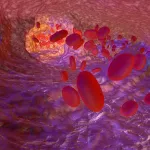(Press-News.org) The research, published in the journal Alzheimer’s & Dementia, is further evidence that the menopause transition is a particularly important time for women and their doctors to pay attention to heart health, in turn protecting their brain health.
“It is shocking to know that two-thirds of Americans with Alzheimer’s disease are women,” said Meiyuzhen (Chimey) Qi, first author and Ph.D. candidate in epidemiology at Pitt Public Health. “The most common modifiable risk factor for dementia is cardiovascular disease, and, interestingly, a woman’s risk for cardiovascular disease increases after menopause. So the next logical step was to see if there was a link between cardiovascular risk factors related to the menopause transition — such as the type of cardiovascular fat a woman has — and her cognitive function later in life.”
To explore the hunch, the team turned to the long-running Study of Women’s Health Across the Nation (SWAN) and its ancillary study, SWAN Cardiovascular Fat. SWAN followed a diverse group of midlife women through the menopause transition. At an average age of 51, 531 participants had scans used to learn about the fat around their hearts and vessels. They were then followed for 16 years, receiving multiple cognitive tests along the way.
Cardiovascular fat consists of three main types: epicardial adipose tissue (EAT) located inside the sac surrounding the heart, paracardial adipose tissue (PAT) located outside that sac and thoracic perivascular adipose tissue (PVAT), which surrounds the longest part of the body’s largest artery leading away from the heart. EAT and PAT are usually lower quality “white” fat that the body stores, while thoracic PVAT may be higher quality “brown” fat that the body readily converts to energy. The team used density of fat in the scans as an indicator of fat quality.
In this study, the researchers assessed how the quantity and quality of cardiovascular fat during midlife are related to cognitive function as women age. Quantity was measured as volume of fat, whereas quality was determined based on the density of fat. A greater volume of thoracic PVAT during midlife was related to stronger long-term memory later in life, while higher density of thoracic PVAT — likely reflecting lower quality white fat — was linked to worsening working memory.
“This is an association. We cannot say with any certainty that higher or lower quality cardiovascular fat causes Alzheimer’s disease — but it is a tantalizing clue that makes sense,” said senior author Dr. Samar El Khoudary, professor of epidemiology at Pitt Public Health. “Of the different types of heart fat, PVAT is located the closest to brain circulation and brown fat is linked to better whole-body metabolism and lower markers for inflammation.”
During the menopause transition, women usually experience vascular or fat tissue inflammation, which may manifest as thoracic PVAT with higher density, meaning it is of lower quality. Previous studies have found that vascular inflammation promotes plaque formation, and inflamed fat tissue has abnormal secretion of cell signaling molecules, which predispose people to cognitive decline.
The SWAN Cardiovascular Fat ancillary study was limited to white and Black women, so the researchers stressed that more study will be needed to see if the findings extend to women of other races and ethnicities or to men. And further research is needed to determine if the type of cardiovascular fat actually causes cognitive decline or if efforts to modify the quality of cardiovascular fat — such as taking anti-inflammatory medications — can stave off dementia.
“That said, I believe our study is more evidence that taking care of your heart helps take care of your brain and that menopause is a particularly sensitive time for heart as well as brain health,” El Khoudary said. “So staying active and regularly doing cardiovascular exercises that get your heart pumping, as well as eating a healthy diet and keeping up with doctor’s appointments, are all especially important at midlife. Protecting your heart during the menopausal transition may be protecting your brain in the future.”
END
Healthy vascular fat during menopause may stave off dementia later in life
2023-06-05
ELSE PRESS RELEASES FROM THIS DATE:
Germline genetic testing after cancer diagnosis – this study is being released to coincide with presentation at the 2023 ASCO Annual Meeting
2023-06-05
About The Study: Among patients diagnosed with cancer in California and Georgia between 2013 and 2019, only 6.8% underwent germline genetic testing. Compared with non-Hispanic white patients, rates of testing were lower among Asian, Black, and Hispanic patients.
Authors: Allison W. Kurian, M.D., M.Sc., of Stanford University in Stanford, California, is the corresponding author.
To access the embargoed study: Visit our For The Media website at this link https://media.jamanetwork.com/
(doi:10.1001/jama.2023.9526)
Editor’s Note: Please see the article for additional information, ...
A simple blood test can now diagnose De Vivo disease
2023-06-05
Glut1 deficiency syndrome is a rare and disabling neurological disease still relatively unknown to the medical community. A mutation in the SLC2A1 gene in affected patients causes the glucose transporter GLUT1 to malfunction. Since this transporter is responsible for the glucose entering glial cells, the brain is deprived of some of the sugar it needs to function correctly, leading to seizures, bouts of abnormal movement, and developmental delays.
These symptoms can be improved by managing the metabolic disorder that causes the disease via a high-fat ...
Amid volumes of mobile location data, new framework reduces consumers’ privacy risk, preserves advertisers’ utility
2023-06-05
The use of mobile technologies to collect and analyze individuals’ location information has produced massive amounts of consumer location data, giving rise to an elaborate multi-billion-dollar system in which consumers can share personal data in exchange for economic benefits. But privacy risks prevail.
In a new study, researchers used machine learning to create and test a framework that quantifies personalized privacy risks; performs personalized data obfuscation; and accommodates a variety of risks, utilities, and acceptable levels of risk-utility tradeoff. The framework ...
Early universe crackled with bursts of star formation, Webb shows
2023-06-05
Among the most fundamental questions in astronomy is: How did the first stars and galaxies form? NASA’s James Webb Space Telescope is already providing new insights into this question. One of the largest programs in Webb’s first year of science is the JWST Advanced Deep Extragalactic Survey, or JADES, which will devote about 32 days of telescope time to uncover and characterize faint, distant galaxies. While the data is still coming in, JADES already has discovered hundreds of galaxies that existed when the universe was less than 600 million years old. The team also has identified galaxies sparkling with a multitude of young, hot ...
NASA’s Webb Space Telescope peers behind bars
2023-06-05
A delicate tracery of dust and bright star clusters threads across this image from the James Webb Space Telescope. The bright tendrils of gas and stars belong to the barred spiral galaxy NGC 5068, whose bright central bar is visible in the upper left of this image – a composite from two of Webb’s instruments. NASA Administrator Bill Nelson revealed the image Friday during an event with students at the Copernicus Science Centre in Warsaw, Poland.
NGC 5068 lies around 20 million light-years from Earth in the constellation Virgo. This image of the central, bright star-forming regions ...
New digital tool enables farmer’s decisions for sustainable agriculture
2023-06-05
A new ‘digital decision support tool’ enabling the transition towards more diversified and sustainable agricultural systems has been developed by an international team of researchers from Germany, France, and Czech Republic.
The research led by Dr Ioanna Mouratiadou from the Leibniz Centre for Agricultural Landscape Research, and published in Environmental Science and Ecotechnology, presents the ‘Digital Agricultural Knowledge and Information System (DAKIS)’ as a data integration ...
CRISPR/Cas9 reveals a key gene involved in the evolution of coral skeleton formation
2023-06-05
Baltimore, MD—New work led by Carnegie’s Phillip Cleves uses cutting-edge CRISPR/Cas9 genome editing tools to reveal a gene that’s critical to stony corals’ ability to build their reef architectures. It is published in Proceedings of the National Academy of Sciences.
Stony corals are marine invertebrates that build large skeletons, which form the basis of reef ecosystems. These biodiversity hotspots are home to about a quarter of known marine species.
“Coral reefs have ...
Human factors affect bees’ communication, researchers find
2023-06-05
Human influences have the potential to reduce the effectivity of communication in bees adding further stress to struggling colonies, according to new analysis.
Scientists at the University of Bristol studying honeybees, bumblebees and stingless bees found that variation in communication strategies are explained by differences in the habitats that bees inhabit and differences in the social lifestyle such colony size and nesting habits.
The findings, published today in PNAS, reveal that anthropogenic change, such as habitat conversion, climate change and the use of agrochemicals, are altering the world bees occupy, and it is becoming increasingly clearer that this affects communication ...
Coaxing hair growth in aging hair follicle stem cells
2023-06-05
· Regulating cell mechanics stimulates hair growth in mice
· Next step will be testing if delivering microRNA via nanoparticles grows hair
· Potential for human hair growth
CHICAGO --- Just as people’s joints can get stiff as they age and make it harder for them to move around, hair follicle stem cells also get stiff, making it harder for them to grow hair, reports a new Northwestern Medicine study.
But if the hair follicle’s stem cells are softened, ...
Cure Mito Foundation launches resource on Leigh syndrome
2023-06-05
McKinney, TX., June 5, 2023 - The Cure Mito Foundation, a parent-led organization dedicated to advancing research and treatments for Leigh syndrome, has launched the first-of-its-kind online resource about Leigh syndrome, the most common type of pediatric mitochondrial disease.
The free resource, “About Leigh Syndrome” (https://www.aboutleighsyndrome.com), serves as a central place where patients, caregivers and doctors can find information on Leigh syndrome, including its symptoms, diagnosis, treatment options, and more. Translation ...







